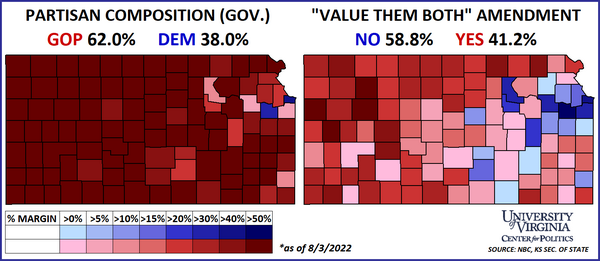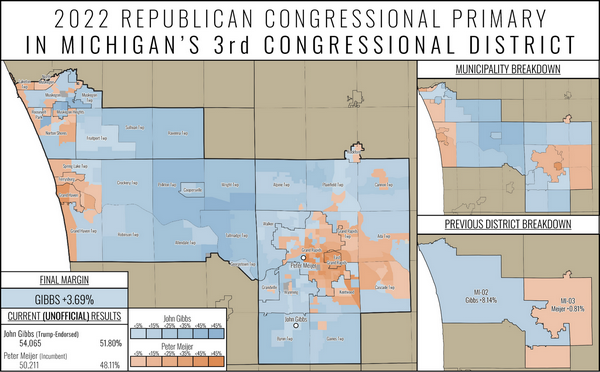| Dear Readers: This is the latest edition of Notes on the State of Politics, which features short updates on elections and politics.
After last night’s big primaries, we go state-by-state below and assess the takeaways, starting with the most notable result of the evening — a decisive victory for abortion rights supporters in Republican-leaning Kansas. — The Editors |
Table 1: Crystal Ball Senate rating change
Kansas
In Kansas, last night’s marquee contest was not a primary but a ballot question. If approved, the measure would have enabled the legislature to pass abortion restrictions by affirming that the state constitution doesn’t guarantee a right to abortion. The result was a surprisingly wide margin for the pro-abortion rights side, as the amendment failed by 18 points.
Turnout was high: though some votes are still being counted, just over 900,000 ballots were cast in the referendum, which was close to 90% of what the 2018 general election saw. While that is impressive, it confirmed our existing feeling that 2022 is on track to be a high-turnout midterm — as pollster John Couvillon has tracked, primary turnout thus far has exceeded that of 2018.
There is a clearly a sizable contingent of abortion rights-supporting Republicans in Kansas. If you look at how many votes were cast in the Republican primary for governor compared to the Democratic primary, it was 62%-38% in the Republicans’ favor. The amendment failed by a smaller but comparable margin. Map 1 compares the results.
Map 1: Kansas primary composition vs abortion vote

One caveat, as pollster Jake Rubinstein notes, is that over 180,000 voters cast ballots in the referendum but not the partisan primaries — this number likely includes many unaffiliated voters who quite possibly lean left (or at least did on this particular issue). Put another way, about half of the voters who cast a ballot on the abortion issue voted in the Republican gubernatorial primary, while the other half was made up of people who either voted in the Democratic primary or just voted for the ballot issue. But the pro-abortion rights side got close to 60% of the vote. So even if every Democratic primary voter and every ballot issue-only voter voted on the pro-abortion rights side (and surely a lot did, but not every single one), there still were some Republican primary voters who voted no.
With that, it’s going to be a question of how much those pro-abortion rights Republicans prioritize abortion. Even if they disagree with Republican candidates on the issue, is it going to override their concerns about inflation or the economy? Ballot issues sometimes create coalitions that do not carry over to partisan elections.
The 3rd District should be a great test case of that. It’s based in the Kansas City suburbs and is a very marginal (Joe Biden +4) seat. Rep. Sharice Davids (D) is in a Toss-up race with Amanda Adkins (R), who lost to Davids in a more Democratic-leaning seat last cycle. The pro-abortion rights side took about 67% in KS-3. That type of result may bode well for Davids — and other vulnerable suburban Democrats — but it is going to fall to her campaign to cast Adkins as out of touch with the district, and even if Davids wins, it will be by a much slimmer margin than the issue.
Abortion rights proponents may have also benefited from holding the “no” position on the ballot, as opposed to the “yes” position, which was the anti-abortion rights position on the ballot. The Kansas issue was asking voters to change the state constitution to allow for abortion restrictions. Writing last year in State Politics and Policy Quarterly, political scientists Joshua J. Dyck and Shanna Pearson-Merkowitz found that the “no” side in a statewide ballot issue can have an easier time getting its message through to voters: “Voters possess a built-in negativity bias and since the status quo occupies that side, negative frames will be more effective than positive frames,” they wrote. This is worth keeping in mind as new statewide ballot issues on abortion emerge as huge electoral flashpoints, as they surely will in this post-Roe era.
Arizona
Though Arizona still has an estimated 20% of its primary ballots left to count, the firmest conclusion that we can come to is that this isn’t John McCain’s state anymore. Last night seemed a banner night for the pro-Trump Republicans.
In the Senate race, Blake Masters, a first-time candidate and venture capitalist who is running with Donald Trump’s endorsement and substantial monetary backing from tech billionaire Peter Thiel, took a 39% plurality in his primary. Masters’ main opposition came from free-spending businessman Jim Lamon and Mark Brnovich, the sitting state Attorney General who has refused to go along with the former president’s baseless allegations of voter fraud.
Masters will go on to face Sen. Mark Kelly (D-AZ), who is running for a full term after winning a 2020 special election to serve out the remainder of the late John McCain’s term. Kelly is one of the Senate’s fundraising powerhouses and ran ahead of Biden in 2020, but our Toss-up rating remains operative.
In the Republican primary for governor, it seems like a late push by the party’s establishment for former state Board of Regents member Karrin Taylor Robson, may not have been enough to stop Kari Lake, a Trump-backed former local news anchor. As of this writing, Lake leads 46%-44%.
While Taylor Robson was initially ahead, as the absentee totals were reported first, Lake put up some crushing numbers as the Election Day vote trickled in. Currently, Phoenix’s Maricopa County is the only county were Taylor Robson leads, but the split there was obvious: she is carrying the absentee vote by a nearly 32,000 raw vote margin, but Lake carried Election Day voters by about 29,000. Far-right Republican candidates fixated on Trump’s complaints about 2020 also won primaries for secretary of state and attorney general.
While Taylor Robson could potentially still pull ahead on the GOP side, Democratic Secretary of State Katie Hobbs easily won her party’s nomination. As with the Senate contest, we are keeping the race as a Toss-up. But as we noted last week, we don’t regard the Masters-Lake combination, if it comes to pass, to be good fit for a state that still leans Republican but is trending Democratic.
In the House, it appears Republican Rep. David Schweikert, who has had some ethical issues in recent years, won renomination to the new AZ-1 with a 43% plurality. This narrowly Biden-won seat could give Republicans trouble down the line, but we are keeping Schweikert as a favorite for 2022. The Crystal Ball also rates Republicans as favorites to flip AZ-2 and AZ-6, the successor districts to the current AZ-1 and AZ-2, respectively.
Michigan
In Michigan, the most closely-watched primary of the night was in the western 3rd District — this Grand Rapids-area seat is the descendant of the district that Gerald Ford held while he served in Congress. First-term Rep. Peter Meijer (R, MI-3) voted to impeach then-President Trump shortly after he got to Congress — something he fully expected would not play well with a primary electorate. Meijer’s primary opposition came from Trump administration alumnus John Gibbs, who got a late boost from the Democratic Congressional Campaign Committee, who viewed the far-right Gibbs as an easier opponent for the fall.
While it’s hard to tell if the DCCC’s pro-Gibbs ad buy was the decisive factor, Meijer lost 52%-48%. It could also be possible that the DCCC’s meddling backfired by energizing pro-Meijer Republicans, and the race ended up being closer than it otherwise would have been. Regardless, the DCCC upset a lot of moderate Republicans (and some Democrats) by intervening here.
There was a geographic component to the result: Meijer narrowly carried the part of MI-3 that he currently represents, while losing the new areas by 8 points. Map 2, from state cartographer Jackson Franks, shows the breakdown.
Map 2: 2022 Republican primary in MI-3

Gibbs will go on to face Hillary Scholten, the 2020 Democratic nominee, in this Biden +9 — but historically GOP — seat. In 2020, Sen. Gary Peters (D-MI) carried the district by less than 2.5 points, showing its down-ballot Republican lineage. For now, the Crystal Ball is holding the race as a Toss-up; we would have moved it to Leans Republican had Meijer won, under the assumption that Meijer would be able to generate more crossover support in the fall.
In the Detroit area, as expected, Rep. Haley Stevens beat out fellow Rep. Andy Levin in the Democratic primary for the Oakland County-based 11th District. Stevens’ win puts an end — at least temporarily — to the Levin dynasty in Congress: Levin’s uncle, the late Carl Levin, was elected to the Senate in 1978 and served until 2015, while his father, Sander, was elected to the House in 1982 and was replaced by the younger Levin in 2018.
Closer in to Detroit proper, Rep. Rashida Tlaib, a member of “The Squad” who was running in MI-12, had a larger-than expected primary win for the second consecutive cycle. In the adjacent MI-13, which saw a crowded primary, state Rep. Shri Thanedar took a 28% plurality. Thanedar carried Detroit proper, but ran especially well in the Downriver communities.
As a result of those Democratic primaries, for the first time since the 1950s, Detroit will not have Black representation in Congress. In fact, if Gibbs and MI-10 Republican nominee John James (who is favored) are elected, both Black members of Michigan’s delegation will be Republicans.
In the Michigan GOP gubernatorial primary — a race filled with below top-tier contenders that was rocked by a ballot-signature kerfuffle that knocked several candidates off the ballot — commentator Tudor Dixon (R) ended up winning quite easily, getting a little over 40% of the vote in a 5-person field and sweeping almost every county. Donald Trump belatedly backed Dixon, although she was already on the path to victory, according to polls, before that.
Dixon recently said that abortion should be banned even in cases of rape or incest, a tough position to defend in a state that appears likely to feature a statewide ballot issue to enshrine abortion rights into the state constitution (this is one where the abortion rights supporters would be supporting the “yes” side, compared to being on the “no” side in Kansas). Gov. Gretchen Whitmer (D-MI) appears to really be benefiting from the GOP’s failure to field a top-tier challenger and the likely intense focus on abortion in Michigan in the fall. We have rated the Michigan gubernatorial race as Leans Democratic all cycle, and we continue to do so.
Missouri
The Crystal Ball’s one rating change from last night will come in the Show Me State. In what initially seemed like a chaotic open-seat primary to succeed Sen. Roy Blunt (R-MO) state Attorney General Eric Schmitt took a clear 46% plurality. Rep. Vicky Hartzler (R, MO-4), who was elected to Congress in the 2010 Republican wave, finished second — her strength was basically limited to her west-central district.
Until now, the Crystal Ball kept Missouri in the Likely Republican column because, for much of this year, disgraced former Gov. Eric Greitens (R-MO) seemed favored to win the nomination. But as anti-Greitens spending ramped up in the home stretch of the primary, his position weakened. Greitens only carried the state’s lightly populated “Bootheel” counties and finished third, with 19%.
In the Democratic primary, philanthropist and beer heiress Trudy Busch Valentine, who seemed to run as a moderate, beat back a more populist challenge from veteran Lucas Kunce. But in the general election, Schmitt will lack Greitens’s baggage. We are moving this race to Safe Republican.
Washington state
As of this writing, there have been a little more than 1 million ballots counted in Washington’s top-2 Senate primary. In 2018’s Senate primary, there were roughly 1.7 million votes cast. So while somewhere in the neighborhood of half the vote or more has been counted, we are not going to make any big-picture observations at this time. (Washington does not take weeks to finalize its votes, unlike California, so we hope to be able to make some observations next week).
In the Senate race, Sen. Patty Murray (D-WA) advanced to the general election against veterans advocate Tiffany Smiley (R) in a sleeper race we rate as Likely Democratic.
The state’s most competitive House race is in WA-8, held by Rep. Kim Schrier (D). She is waiting to see who finishes second and advances to the general election — Matt Larkin (R), the GOP’s 2020 state attorney general nominee, had a 16%-15% edge over King County Councilman Reagan Dunn as of Wednesday morning (Dunn’s mother once held a version of this district). Joe Biden won this district by a little under 7 points in 2020, making it a very credible Republican target — again, we’ll have more to say about it later.
Two of the 10 Republicans who backed Donald Trump’s second impeachment, Reps. Jaime Herrera Beutler (R, WA-3) and Dan Newhouse (R, WA-4), were also on the ballot. Both currently occupy 1 of the 2 top slots in their races, and the other slot is occupied by a Democrat, but Republican rivals are close enough behind that neither race has been called. The 4th District is Safe Republican regardless; Herrera Beutler should be fine, too, so long as she advances to the general election. Just like Rep. David Valadao (R, CA-22), another impeachment supporter who advanced to the general election through a top-2 system, Herrera Beutler and Newhouse may very well have been helped by the top-2 system (it’s possible all 3 would have lost in a more traditional primary setting).
The top-2 results will be useful to comb for clues about November, but in the words immortalized by Orson Welles’ commercials for Paul Masson wines, “We will sell no wine before its time.”




















Discussion about this post